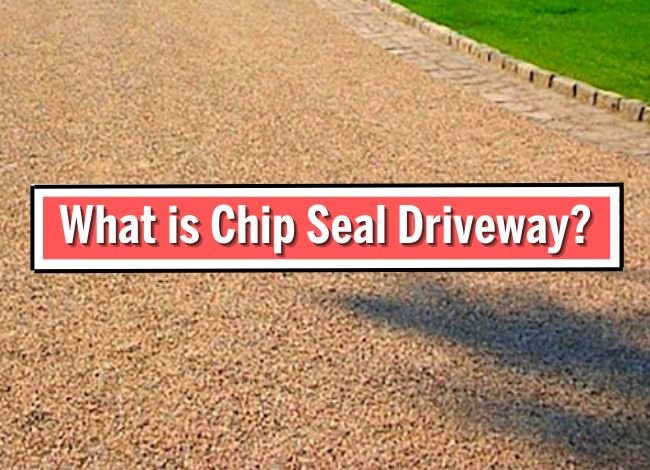Last Updated on April 22, 2025
Traditional driveways are typically constructed using concrete, gravel, or asphalt. However, another cost-effective and increasingly popular option is the chip seal driveway—especially among homeowners looking for a durable yet affordable alternative.
The term “chip seal” comes from the small crushed rocks, or “chips,” that are used in the sealing process. A chip seal driveway combines the benefits of both asphalt and gravel, offering a rugged surface with enhanced durability at a lower cost.
Follow our step-by-step guide on how to apply driveway sealer effectively.
What Is Chip Seal Driveway?
A chip seal driveway is made up of two distinct layers:
- Base Layer (Asphalt Emulsion): This first layer involves spraying hot asphalt emulsion onto the prepared surface. It acts as a binder, similar to what’s used in traditional asphalt paving.
- Top Layer (Crushed Stone Chips): A layer of small, crushed rocks is spread over the asphalt and then rolled in to ensure strong adhesion. This layer provides added texture, improved traction, and protection for the base layer.
This dual-layer system creates a solid surface that is both aesthetically rustic and economical. Because the installation cost is lower than that of full asphalt or concrete paving, many homeowners choose chip seal driveways to stay within budget without sacrificing functionality.
How Long Does a Chip Seal Driveway Last?
The lifespan of a chip seal driveway is generally shorter than that of traditional asphalt or concrete driveways. On average:
- Chip seal driveways last about 10 to 15 years.
- Concrete driveways can last up to 20 years or more.
- Asphalt driveways typically last 25 to 30 years.
Although not the longest-lasting solution, chip seal driveways offer great value for money, especially when properly maintained.
How to Extend the Lifespan of a Chip Seal Driveway?
While chip seal driveways have a shorter lifespan by default, proper application and maintenance can significantly extend their durability. Here’s how:
- Apply at the right time: The best time to apply a chip seal is when the pavement is still in fair condition. Sealing at the right stage can double its lifespan.
- Regular resealing: Reapplying chip seal every few years can keep the surface intact and prevent moisture or UV damage.
- Proper drainage: Ensuring your driveway has good water runoff prevents erosion and structural weakening.
When done correctly, a chip seal driveway can last up to 15 to even 30 years, making it a competitive option for budget-conscious property owners.
For long-term protection against moisture and cracking, consider using a penetrating sealer like the Foundation Armor SX5000. And Discover how often you should seal your driveway to maintain its longevity.
What Are the Advantages of a Chip-Sealed Driveway?
Chip-sealed driveways have become a popular choice for homeowners due to their affordability, durability, and rustic aesthetic. Here are the top advantages of choosing a chip seal driveway:
1. Cost-Effective Driveway Sealing Solution
One of the biggest advantages of a chip-sealed driveway is cost reduction. If you’re looking to minimize driveway sealing expenses, chip sealing can save you up to 50% compared to asphalt or concrete paving. This makes it an excellent option for large driveways or long rural roads where budget is a concern.
2. Enhanced Curb Appeal with Custom Colors
Chip seal driveways offer a visually appealing finish, thanks to the variety of stone aggregates available. You can select stones in different colors to complement your home’s exterior or natural surroundings. Unlike traditional black asphalt, chip seal driveways allow for customization and offer a more natural, rustic look—perfect for homeowners who want their driveway to stand out.
Asphalt sealers typically come in black due to the tar composition, while chip seal gives you more freedom to choose from natural color tones.
3. Improved Gravel Road Stability
Chip sealing is especially beneficial for gravel roads. It effectively locks the loose gravel in place, preventing it from washing away during heavy rain or becoming displaced during the winter. This creates a safer, smoother driving surface and eliminates the need for frequent gravel replenishment.
4. Reduced Heat Retention
Unlike blacktop driveways that absorb and retain heat, chip-sealed surfaces reflect more sunlight due to their lighter color options. This helps to reduce surface temperature and keeps the surrounding environment cooler, especially during hot summer months.
5. Low Maintenance and Long Lifespan
Chip seal driveways require very little maintenance. Once installed, they can last between 7 to 10 years with minimal upkeep. Occasional sweeping and sealing can extend the lifespan even further, making it a smart long-term investment.
For other driveway types, you can explore our list of the best driveway sealer to find the most suitable option for your needs.
Bottom Line
If you appreciate simplicity, natural aesthetics, and cost efficiency, a chip-sealed driveway is a solid choice. It delivers a country-style charm while providing durability and performance. With benefits like reduced maintenance, improved appearance, and better gravel retention, chip seal can easily compete with more expensive options like asphalt and concrete.

